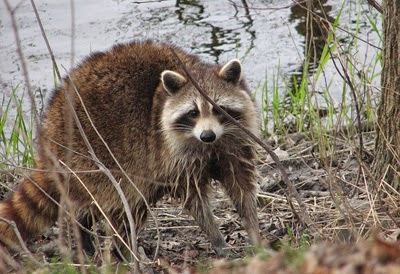Raccoons are fascinating creatures, known for their intelligence, dexterity, and, unfortunately, their distinct odor. While their masked faces and playful antics might charm some, encountering a raccoon with a strong, musky smell can be quite off-putting. This article delves into the reasons behind what do raccoons smell like and why some individuals emit a more pungent aroma than others. We’ll explore the role of their anal glands, factors influencing odor intensity, and tips on dealing with raccoon smells.
Why Do Raccoons Smell?
Raccoons, like many other animals, possess scent glands that play a crucial role in their communication and territorial behavior. These glands, primarily located near their anus, produce a strong-smelling secretion that serves as a unique identifier. When a raccoon encounters another raccoon, it might rub its anal glands against objects or the ground, leaving behind a scent message. This scent marking helps establish territory boundaries, warn off rivals, and attract potential mates.
The specific scent produced by a raccoon is often described as musky, ammonia-like, or even slightly sweet. It’s a complex mixture of chemicals that can vary in intensity depending on factors such as the individual raccoon’s diet, health, and reproductive status. While not all raccoons smell intensely, those that do can leave a lasting impression.
Anal Glands and Scent Marking

The anal glands are a pair of small sacs located on either side of a raccoon’s anus. These glands are connected to the raccoon’s digestive system and produce a thick, oily secretion that is released when the raccoon feels threatened, excited, or during territorial marking. The scent produced by these glands is highly concentrated and can travel long distances, allowing raccoons to communicate with each other over considerable distances.
Raccoons have a sophisticated system for scent marking. They rub their anal glands against objects, trees, or the ground, leaving behind a distinct scent trail. This scent trail serves as a message to other raccoons, indicating the presence of a particular individual or group. By strategically placing scent marks, raccoons can effectively communicate their territory boundaries, warn off intruders, and attract potential mates.
Factors Influencing Scent Intensity
Several factors can influence the intensity of a raccoon’s scent.
- Diet: A raccoon’s diet can significantly impact the odor produced by its anal glands. Raccoons that consume a lot of garbage or decaying matter may have a stronger, more unpleasant smell.
- Health: Just like humans, raccoons can develop health issues that affect their scent. Infections, parasites, or other medical conditions can alter the composition of their anal gland secretions, resulting in a stronger or more unusual odor.
- Reproductive Status: During mating season, male raccoons often produce a more intense scent to attract females. This heightened scent production is part of their natural reproductive behavior.
Raccoon Odor Intensity
While all raccoons possess anal glands and produce a musky scent, the intensity of this odor can vary greatly. Some raccoons may have a faint, barely noticeable smell, while others can emit a strong, pungent aroma that lingers in the air.
Several factors contribute to this variation in odor intensity, including the individual raccoon’s diet, health, and reproductive status. Raccoons that consume a lot of garbage or decaying matter may have a stronger, more unpleasant smell. Similarly, raccoons that are sick or stressed may produce a more intense scent as a result of hormonal changes.
Identifying a Stinky Raccoon

If you encounter a raccoon with a strong odor, there are a few key characteristics to look for.
- Musky Smell: The most obvious sign is the distinct musky, ammonia-like smell. This scent is often described as pungent and can be quite overpowering.
- Rubbing Behavior: Raccoons often rub their anal glands against objects or the ground to leave behind scent marks. If you see a raccoon rubbing its rear end on a tree or fence, it’s likely marking its territory.
- Defensive Posture: If a raccoon feels threatened, it may raise its hackles, growl, or hiss, and its anal glands may release a stronger scent as a warning signal.
Dealing with Raccoon Odor
Encountering a raccoon with a strong odor can be unpleasant, but there are steps you can take to minimize the smell.
- Avoid Contact: The best way to avoid raccoon odor is to avoid contact with raccoons altogether. Keep your distance and do not approach them, especially if they appear agitated or defensive.
- Clean Up Spills: If you find raccoon droppings or urine, clean them up immediately using a strong disinfectant. Wear gloves and a mask to protect yourself from the odor and potential pathogens.
- Seal Entry Points: Raccoons are known for their ability to squeeze through small openings. Seal any potential entry points to your home or shed to prevent raccoons from entering and leaving their scent behind.
- Professional Removal: If you have a raccoon infestation, it’s best to contact a professional wildlife removal service. They have the experience and equipment to safely and humanely remove raccoons from your property.
Conclusion
Raccoons, with their masked faces and clever paws, are undeniably fascinating creatures. However, their strong, musky odor can be a significant nuisance. Understanding the reasons behind do raccoons smell bad and the factors influencing odor intensity can help us appreciate these animals while minimizing the unpleasantness associated with their scent. By taking steps to avoid contact, clean up spills, and seal entry points, we can coexist with raccoons while keeping our homes and surroundings odor-free.



